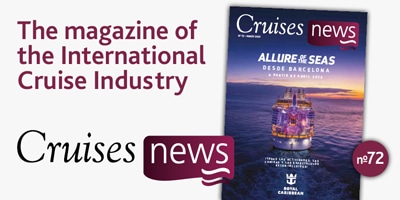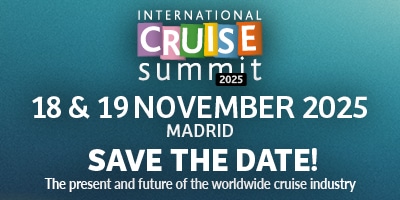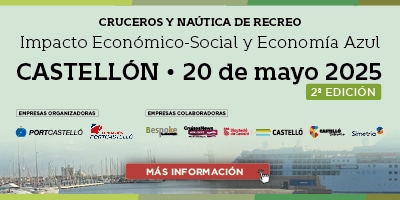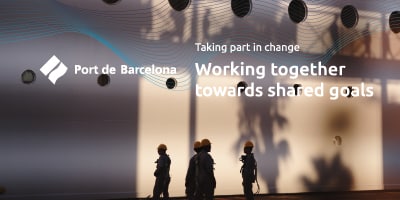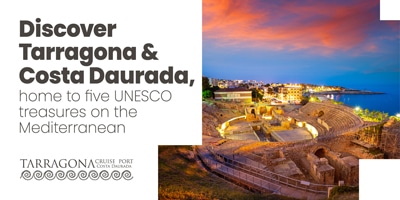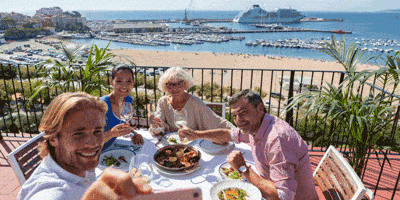CRUISES NEWS INTERVIEWS: Richard J. Vogel, President & CEO Pullmantur Cruceros
 Who could have said just over a month ago that we would be in lockdown, at home, with the cruise ship fleet at a standstill and in the midst of a practically global emergency health crisis. Do you think that there are any cruise ship companies in the world, or companies in other sectors, that were prepared for a situation like this?
Who could have said just over a month ago that we would be in lockdown, at home, with the cruise ship fleet at a standstill and in the midst of a practically global emergency health crisis. Do you think that there are any cruise ship companies in the world, or companies in other sectors, that were prepared for a situation like this?
If we had been asked three months ago, it would have been almost impossible to predict that we would be living through such an unprecedented situation – it seems more like the plot of a movie or a novel than reality…
Since this health crisis became more serious in January, cruise companies started to prepare with one clear and defined goal in mind: prevention. As a consequence, we promoted a series of measures that included, among others, denying boarding to passengers who traveled or transited through certain areas as well as medical questionnaires prepared ad hoc. And we did not just stay in a preliminary phase – our medical teams worked extensively to develop specific protocols to deal with possible cases of COVID-19 on board.
That being said, I do not think that any companies, regardless of their activity, or governments or institutions were 100% prepared to deal with a pandemic of this magnitude, capable of almost completely paralyzing the world, and with the devastating consequences that we are experiencing on a daily basis.
The cruise industry is perceived as powerful and resilient but, after having completely shut down, is this sector going to be able to resume its operations after a few months without paying a high price?
I would love to say no, but I have to admit that we are going to pay (and are already paying) a high price for several reasons.
On the one hand, we have had to cancel the vacations that thousands of clients had scheduled for the end of March, April and May. On the other hand, right now, we would have to be focused on preparing the summer campaign, completing the sale of the inventory that we still had available for the high season but the reality is that, like the tourism industry in general, we have had to “press pause”.
As we get closer to the light at the end of the tunnel, and once we climb out of this, we will see how the general public’s consumer habits evolve (including travel habits) and how the future regulations approved by different governments will affect our operations. However, one thing is clear: we will have to redefine processes and consider the effects of the economic crisis that will hit a large number of countries, including Spain.
Not to forget the running expenses for the lay-up, crew costs, salaries etc…
But I am positive and fully convinced that the sector will emerge stronger from this situation, as it has done on other difficult occasions. In order to achieve this, all the actors involved in this sector, from cruise lines to destinations, ports, travel agents, tour operators, etc., must be more united than ever, showing the strength of our vacation options and focusing on communicating our advantages the best way possible.
In March, the global cruise fleet voluntarily decided to suspend the fleet. Where did Pullmantur’s ships dock? Was it difficult to find ports to disembark passengers and crew and wait until operations restart?
In our case, we currently have one ship in Panama (the Monarch), one in Dubai (the Horizon) and a third one in Malaga (the Sovereign). Although we experienced intense days full of uncertainty, where the playing field changed permanently and we faced numerous challenges, now, with a global perspective, I would say were a bit lucky that two ships of our fleet could stay at its homeports like Dubai and Colón. We appreciated the support of the port of Malaga to lay up the Sovereign there. By talking the decisions very early, to suspend the cruises, we were able to repatriate all our guests in time.
Were crew members able to return home or are they all still on board? How can repatriations be set up so quickly and so unexpectedly?
We have managed to repatriate more or less half of our crew but, unfortunately, not all of them. In fact, this is one of the lines of work that we have still open.
Our intention was to return as many crew members as possible to their countries, but we reached a point where he had to stop our efforts. As we all know, the situation was constantly changing and, even though we had flights (mostly with connections) confirmed at the time of disembarkation, we could not guarantee that schedules would remain the same; under no circumstances did we want to risk our crew being stranded at an airport. On the other hand, countries have closes step by step their border
Consequently, we decided to stop the repatriations and wait until the situation returns to normal (as much as possible) or better said, borders are open and flight could be guaranteed . Throughout this process, we have been (and still are) in contact with various embassies in order to join forces.
And looking to the future, how will you resume operations? Will all ships begin to operate at the same time? Will changes be made to the itineraries? Can you plan anything in the face of so much uncertainty?
Since announcing the suspension of cruise operations, we want nothing more than to set sail again as soon as possible. At this time, we are planning to start our operations end of May, but we also are depends on the restrictions of the destinations and in our cases also in flight opportunities.
However, we must be realistic and not turn our backs on reality; the truth is that we are immersed in an environment full of uncertainty that requires us to be completely flexible and capable of deviating from the planned course of action. For this reason, we are working to design different contingency plans that we could activate, if necessary, depending on how events unfold. We want to be prepared to act quickly and consistently: our world will no longer be what it used to be.
Tourism in general has stopped and travel agencies, the main way to sell cruises in this country, are in a very complicated situation. How are they collaborating with the sector? Can they expect to receive any help from shipping companies (in general) or Pullmantur (in particular)?
Tour operators and travel agents, with whom we have an excellent relationship, have been, are and will be our main business partners. In these exceptional times, we continue to work with them hand-in-hand, as a team, to find methods that benefit both of us and that allow us to move forward.
And yes, there are activities from Cruise Lines to support Travel Agencies, for example by changing the cancellation policies, incentives for re-bookings, etc.

The sector has been put in the spotlight. Are changes to how you operate with passengers going to be implemented? Are regulations being reviewed? What can you tell us about the health and sanitation control on board?
Although we are still waiting for the guidelines from different authorities, we are already deeply involved in defining what tomorrow’s operations will be like. It is clear that the coronavirus outbreak will be a watershed moment and many processes that were once commonplace will be redefined. However, it should be noted that the health and sanitation standards on board were already very high, even higher than those required shoreside.
Spain, Italy and France have been hit hard by this pandemic and are countries that are part of the most important itinerary in the Mediterranean. Do you think there will be winter cruises in the Mediterranean?
I believe that will be the case. We are talking about destinations that are in great demand and that captivate millions of tourists every year.
This has occurred at the time of a record demand in the cruise-ship industry. If this was already an ongoing debate, doesn’t it seem like there will be more supply than demand in the upcoming years? Are they going to pause the transfer and refit of the Grandeur?
Everything will depend on how COVID-19 evolves, when the vaccine is found, if there is a spike in cases in the fall, what will happen to the economies, etc. But I want to think that in the coming years (starting in 2021) there will be a good balance between demand and supply; it will be different from source market to source market. Once we return and get used to the new normal, we will want to continue traveling, discovering new destinations, craving new experiences, etc.
In relation to the Grandeur, we haven’t change our plans
Every night the Sovereign joins the city of Malaga’s tribute to healthcare workers, and Pullmantur Cruises has made contributions to food banks. Tell us about it.
That is correct. We have donated around 13 tons of food and beverages to the Malaga City Council and the Government of the Colón Province of Panama, benefiting nearly 1,800 people.
As a company, we must act responsibly, always focusing on people (who have a leading role) and adding value in one way or another.
As for the Sovereign ship, yes, every afternoon it becomes just like every other citizen, its whistle joining the applause of the people of Malaga at their windows to pay tribute to the healthcare workers who tirelessly fight the coronavirus day and night. It is our way of showing thanks to these heroes, who care for us from the front lines.
Finally, other countries are talking about an increase in reservations by 2021. Give us a prediction. How and when will the industry recover?
In my opinion, the industry will not begin to recover and reach pre-pandemic levels until at least 2021. The ability of countries to contain, control and defeat COVID-19, its development in the coming months and the economic consequences of this pandemic will undoubtedly determine the growth rate and the speed with which we return to the new normal. And it will be linked very strong to how fast the economy will recover.


